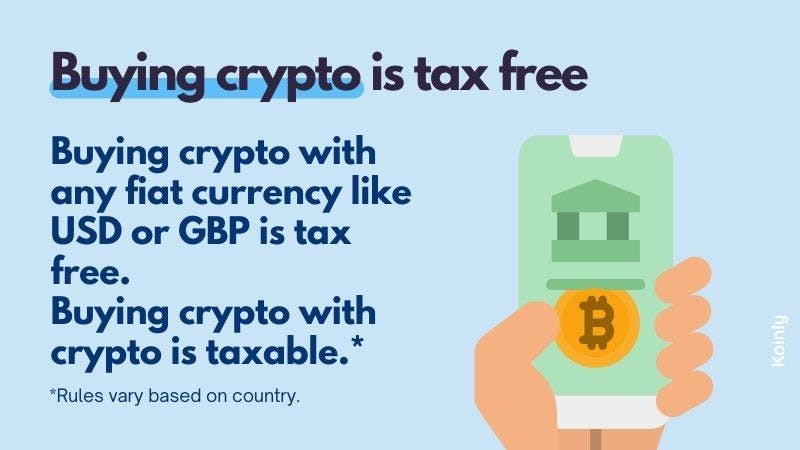Do You Pay Tax When You Buy Cryptocurrency?
Tax authorities around the world are putting pressure on crypto investors to report their crypto income and gains accurately - leaving a lot of crypto investors wondering which of their transactions are taxed, for example, do you pay tax when you buy cryptocurrency?
Crypto investors are realizing they need to take crypto taxes seriously. Tax offices such as the ATO, HMRC, and the IRS have sent out hundreds of thousands of warning letters to investors who they believe aren’t reporting their crypto investments accurately.
As such, many investors are trying to figure out which of their crypto transactions are taxable for the first time - especially when government guidance is often vague at best!
Fortunately, if you’re wondering whether you pay tax when you buy cryptocurrency, the answer is pretty straightforward.
Do you pay tax when you buy cryptocurrency with fiat currency?
If you’re buying cryptocurrency with any fiat currency - for example, USD, AUD, or GBP - then you won’t pay any tax when you buy cryptocurrency.
This is because of the way countries view cryptocurrency. In almost every country (bar El Salvador and Bitcoin) cryptocurrency isn’t viewed as a legal tender. Instead, they see it as a type of asset - similar to a stock or a rental property.
From a tax perspective, you’re making an investment to buy an asset. This isn’t subject to tax. When you later dispose of that asset by selling it, swapping it, spending it or (sometimes) gifting it, this would be viewed as a disposal and subject to Capital Gains Tax.

Do you pay tax when you buy crypto with crypto?
But what if you’re buying new coins or tokens with a cryptocurrency you already own?
In most countries, using crypto to purchase other crypto is seen as a disposal. You’re getting rid of one asset to acquire another. It doesn’t matter if it’s to buy crypto, dollars, or goods, you’re making a realized gain (or loss!) by exchanging the two assets. As such, this would be subject to Capital Gains Tax.
EXAMPLE
You buy 0.1 BTC for $5,000. You later trade that 0.1 BTC for 2 ETH, with a $50 transaction fee. The FMV of 1 ETH that day is $3,000 and the FMV of 0.1 BTC is $6,000.
You’ve “disposed” of your 0.1 BTC. You need to calculate your cost basis and any subsequent profit or loss. You do this by subtracting your cost basis (what you bought it for + any associated fees) from the price you sold it for.
$5,000 + $50 = $5,050. This is your cost basis.
$6,000 - $5,050 = $950. You made a gain of $950. This would be subject to Capital Gains Tax.
Check your country’s crypto tax rules
It’s worth pointing out, there are a couple of exceptions to this rule. While most countries view swapping crypto as a disposal, there are a couple of outliers. For example, France only taxes cryptocurrency at the point it is converted to fiat currency, so buying crypto with crypto would be tax free.
You should always check your country’s crypto tax rules to check how and when your crypto transaction will be taxed. Koinly keeps a close eye on crypto tax rules around the world. You can check out our regularly updated tax guides for:
How Koinly can help
Our crypto tax software can calculate your crypto taxes for you. Once you’ve synced all your crypto wallets and exchanges, Koinly identifies all your different crypto transactions, applies the relevant crypto tax laws for where you live, and calculates any gains or losses.
All this information is then available to you on your tax reports page, where you can download tax reports for your country.
Summary
You won’t pay tax when you buy crypto with fiat currency.
You’ll pay tax when you buy crypto with crypto, in most countries.
Buying crypto with crypto is seen as a disposal in most places.
Disposals are subject to Capital Gains Tax.




